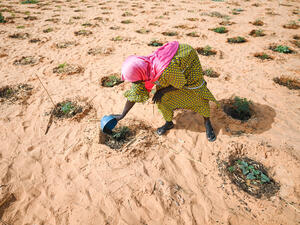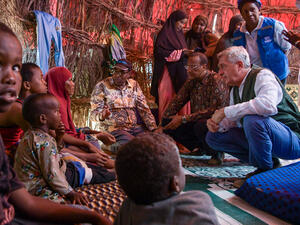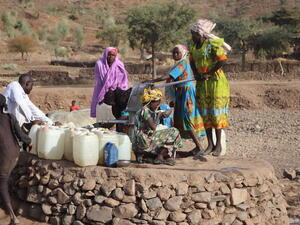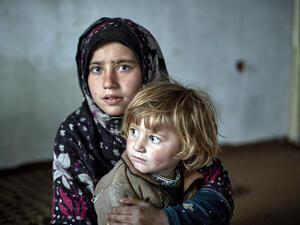UNHCR calls anew on international community to help Mali as war expands
UNHCR calls anew on international community to help Mali as war expands

This 10-year-old boy escaped recent fighting in the Malian town of Diabaly and found refuge in the capital, Bamako.
BAMAKO, Mali, January 25 (UNHCR) - The UN refugee agency on Friday renewed its call for increased international aid for hundreds of thousands of forcibly displaced Malian civilians, warning that stepped up aid was vital to prevent a worsening of the humanitarian situation across the Sahel region.
Since the start of the conflict in northern Mali a year ago, more than 150,000 refugees have fled to neighbouring Mauritania, Niger and Burkina Faso, while nearly 230,000 have sought safety in other areas inside Mali. In Bamako, Mali's capital, the number of internally displaced people (IDP) is now estimated at close to 50,000. Most are living in poor neighbourhoods with little or no access to housing or vital services such as clean water, education and health.
People fleeing the current fighting between French-backed government forces and rebels in the north of Mali tell alarming accounts of atrocities. A former resident of Gao, who left the northern town after recent air strikes, told UNHCR that food and fuel were in short supply.
"The situation in Gao is difficult. The rebels took all the medicines from Gao hospital. I saw dead bodies everywhere, in the yard of the hospital," said Agesha, who fled the town last Sunday and took three days to reach the Mali capital, Bamako, via Niger and Burkina Faso. "They were bringing wounded fighters from the Konna [area] fighting. Many were foreigners, from various nationalities," she claimed.
The 18-year-old said she had seen a woman being summarily executed for refusing to show the contents of her bag to a rebel fighter when she was boarding a bus. "Another rebel came, put a gun against her head and shot her. I also saw people having hands or feet amputated as a punishment for supposedly having stolen goods," said Agesha.
IDP families in Bamako told UNHCR that they had been uprooted by the conflict several times, fleeing ahead of the rebel advance. They lost most or all of their belongings and left relatives behind. Fighters are not preventing people from leaving the areas they control but they check their bags thoroughly and take away any food, money or valuables.
In neighbouring Mauritania, Burkina Faso and Niger, UNHCR is hearing similar accounts from newly-arrived refugees who are interviewed to determine protection and assistance needs. Children are reportedly being abducted from their families and made to fight for the rebels. Armed groups are also confiscating private vehicles - one of the reasons why refugees are travelling huge distances on foot or by donkey.
In Burkina Faso, many of the new arrivals are ethnic Tuareg and Arab women and children. Some said they fled for fear of becoming confused with the rebels. Another reason for leaving northern Mali, according to the refugees, was the presence of bandits and militia from other ethnic groups. Food and other essentials are in short supply, with markets closed and shops empty.
Some of those questioned in the Mali capital said they had been displaced several times. Salif, aged 20, fled from Timbuktu last April with his parents, five siblings and two cousins. He said it was difficult to attend school when the rebels took over the town.
"The rebels did not want some classes to take place such as physics, biology and philosophy. They said those classes were subversive. All remaining classes had to be given in Arabic, no lessons in French anymore," he explained, adding that many schools closed and the teachers left the city.
He and his family fled to the town of Mopti and rented a house, but decided to leave amid rumours of an impending attack. They found shelter some 20 kilometres away in Sevare. After the fighting flared up again earlier this month, Salif said, "a lot of wounded soldiers were evacuated to the Sevare hospital." Worried that the rebels would come to Sevare, Salif and his family fled again, this time to Bamako. "A cousin helped us to find an apartment in the capital. She is helping us to pay the rent now, but for how long?," he wondered.
Since 11 January, when the French military intervened to help the Malian army stop an offensive by extremist fighters, more than 9,000 new refugees have fled the country and been registered and assisted by UNHCR and partners in Mauritania, Niger and Burkina Faso.
According to UNHCR's latest figures, since January 11 a total 5,486 Malian refugees have arrived in Mauritania, 2,302 in Burkina Faso and 1,578 in Niger. They joined the 54,000 refugees in Mauritania, 50,000 in Niger, 38,800 in Burkina Faso and 1,500 in Algeria, who had fled earlier fighting. Some Malians fleeing northern Mali have, like Agesha, gone through Niger and Burkina Faso before reaching Bamako - a three-day journey at the costly equivalent of about US$120.
There is consensus among most humanitarian organizations working in Mali that the humanitarian situation in the country was already at crisis point and deteriorating, even before the recent round of fighting.
The countries of the Sahel region have been facing severe drought conditions for years and are among the poorest in the world. UNHCR is appealing for urgently increased assistance for these countries to help them cope with the continuing arrival of thousands of terrorized, traumatized and destitute refugees from the war in Mali, most of them women and children.
UNHCR appealed last year for US$123.7 million for its Mali crisis operations, but has received only about 60 per cent of this amount. The most urgent needs are food, shelter, clean water, sanitation, health and education.
By Hélène Caux and William Spindler in Bamako, Mali








